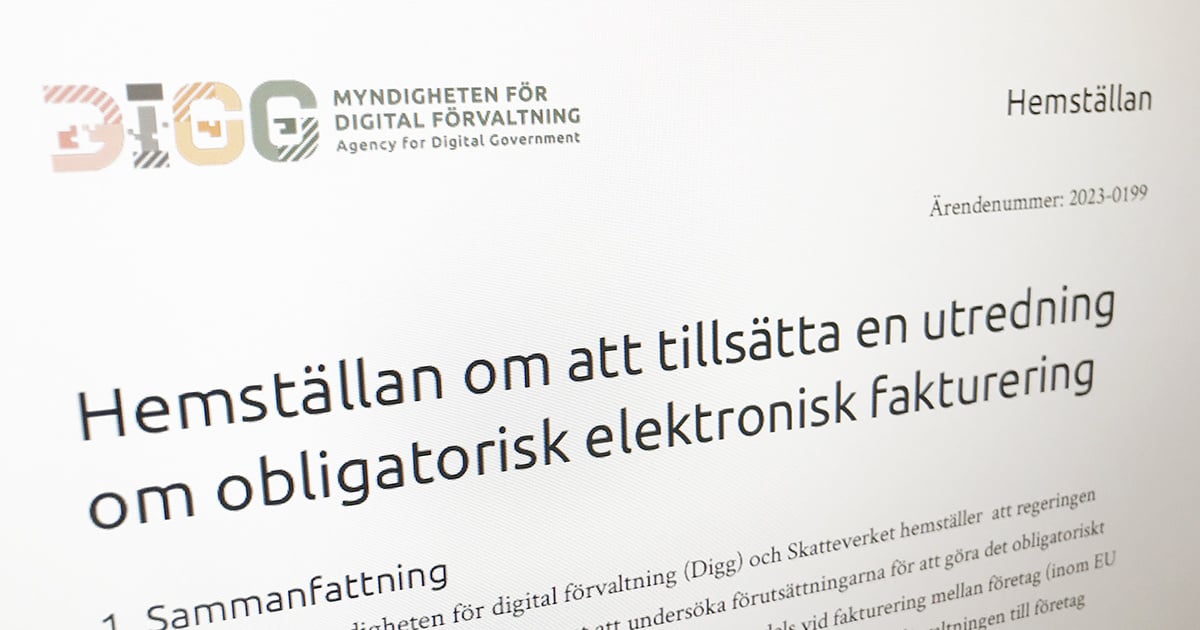No to e-invoices is a no to digital growth

Sweden will be the best in the world at using the opportunities of digitization. This goal was set at government level six years ago. It is an aggressive and good goal because it leads to technological development, strengthened competitiveness and major environmental benefits.
These are also the reasons why the country's public administration likes electronic invoices. E-invoices are fast, efficient, secure and mean lower costs while reducing the circulation of paper in society.
But despite these positive effects, the organization Företagarna - which represents 60,000 entrepreneurs in many different industries - protests that the e-invoice may become mandatory.
The attitude is strange. Swedish business is usually synonymous with foresight and innovation. But here, Företagarna, or at least Erik Östman (expert on regulatory simplification) who expresses opposition on the organization's website, chooses to set a record in backwardness.
What has happened, and which causes Erik Östman to press the brake pedal in the middle of a healthy and natural digital process, is that the Swedish Companies Registration Office, the Swedish Tax Agency and DIGG (the Swedish Agency for Digital Government) have requested the government to investigate the possibility of making it mandatory for companies and public authorities to use e-invoices.
The proposal is wise. Since 2019, Sweden has had a law that invoices resulting from public procurement must be sent electronically. And the 'shall' requirement for the same thing is even more years old. In fact, as early as 2008, a recommendation was issued to municipalities and regions to ask their suppliers to send e-invoices.
But this logical development in a digital age has apparently not dawned on everyone. So, 15 years later, the Federation of Swedish Enterprises still thinks it's unreasonable to ask for electronic invoicing.
Jesus.
15 years after the first recommendation, the Federation of Swedish Enterprises still thinks it's unreasonable to ask for electronic invoicing. Yikes.
Simon Strandell, Head of Sales, InExchange
The authorities who turned to the government are doing the right thing. The time has come to speed up the use of e-invoices. In December, the European Commission published its proposal to amend the VAT Directive and make digital invoicing the norm within the Union, phasing out PDF invoices by 2024. If the European Parliament approves the proposal (VAT in the Digital Age), e-invoicing will become mandatory for cross-border trade within the EU.
Should we then distinguish ourselves as the least digitized country in the alliance and bury ourselves nationally in cumbersome paper trails?
No, is the obvious answer, but not for Företagarna or rather Erik Östman because it is difficult to know how entrenched this view actually is within the organization. Erik (and the entire membership?) sees no reason why rules for cross-border trade should also be made the model for domestic business.
He is happy with the old invoice mess where individual routines abound and where suppliers are forced to adapt to lots of individual solutions that all fit within the platitude "freedom of contract".
But whether the loyal belief in outdated methods is particularly widespread seems doubtful. It is more likely that among the organization's 60,000 business owners, there are many who welcome standardization and like continued digital development because they have realized all the benefits.
It will not be more complicated with e-invoices. It will only be simpler.
And it will help Sweden to become the best in the world at using the opportunities of digitization.
Simon Strandell, Sales Manager, InExchange
Here you can read the post where Erik Östman, expert Företagarna regelförenkling, expresses his opposition to mandatory e-invoicing:
"Do not force e-invoicing"


